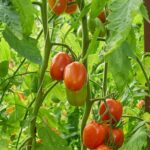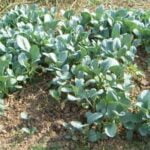Organic pest control is becoming increasingly popular among gardeners who are looking for ways to protect their plants and crops without relying on harmful chemicals. One such product that has gained attention in recent years is Sluggo, a slug and snail bait that is claimed to be safe for use in vegetable gardens.
However, before using any product in your garden, it’s important to understand its purpose and potential risks. In this article, we will examine the safety of Sluggo for vegetable gardens and explore its effectiveness in controlling slugs and snails.
Sluggo is a type of bait that contains iron phosphate, an ingredient known to be effective in killing slugs and snails. Unlike traditional chemical pesticides, Sluggo is considered organic because it breaks down into natural compounds that are harmless to people, pets, and the environment. This makes it a preferred choice for many gardeners who prioritize eco-friendly solutions.
As with any pest control product, understanding the ingredients used in Sluggo is crucial to determine its safety for use in vegetable gardens. We will delve into the components of Sluggo and assess any potential risks they may pose to your plants or produce.
Additionally, we will explore the effectiveness of Sluggo in controlling slugs and snails. Does it truly live up to its claims? We will review scientific research and studies conducted on Sluggo to provide evidence-based insights into its efficacy as a pest control option.
By the end of this article, you will have all the information you need to make an informed decision about whether or not Sluggo is safe for your vegetable garden. Stay tuned as we dive deeper into the topic by examining ingredients, researching its effectiveness, considering alternative options, and reviewing customer experiences.
Sluggo is a popular organic pest control product that is widely used in vegetable gardens. It is specifically formulated to target slugs and snails, which are common pests that can cause significant damage to plants and crops. Slugs and snails are known for their voracious appetites and can quickly decimate a garden if left unchecked. However, using chemical pesticides to control these pests can be concerning for those who aim to maintain an organic garden.
Sluggo offers a safe and natural alternative for gardeners who want to protect their vegetable plants from slugs and snails without resorting to synthetic chemicals. The product contains iron phosphate as its active ingredient, which is a naturally occurring compound that is non-toxic to humans, pets, and beneficial insects when used as directed. Iron phosphate works by causing slugs and snails to stop feeding after ingestion, leading to their eventual death.
The granular form of Sluggo makes it easy to apply in the garden. Simply sprinkle the pellets around susceptible plants, such as lettuces, kale, strawberries, or any other vegetables that are vulnerable to slug or snail damage. The product breaks down over time and enriches the soil with iron, providing additional benefits beyond pest control.
Using Sluggo as part of your pest control regimen in your vegetable garden can help ensure the health and productivity of your plants while respecting organic principles. Its effectiveness in controlling slugs and snails combined with its safety for both humans and beneficial organisms make it an excellent choice for any gardener looking for an eco-friendly solution to common pest problems.
Sluggo is a popular organic pest control product that is commonly used in vegetable gardens. This section will delve into the ingredients in Sluggo and examine its safety for use in vegetable gardens.
One of the key ingredients in Sluggo is iron phosphate, which is a naturally occurring substance found in soil. Iron phosphate is considered to be safe for humans, pets, and wildlife when used as directed. It works by attracting slugs and snails, causing them to consume the pellets, and then leading to their demise. Unlike chemical pesticides, Sluggo does not leave harmful residues on the vegetables or in the soil.
In addition to iron phosphate, Sluggo also contains other inert ingredients such as bait substances that enhance its attractiveness to slugs and snails. These ingredients are carefully selected to ensure maximum effectiveness without posing risks to humans or the environment. However, it’s important to note that while Sluggo is generally safe for use around edible plants, it should still be applied according to the manufacturer’s instructions and precautions should be taken to minimize exposure during application.
When using any pest control product in a vegetable garden, it’s crucial to prioritize safety and consider potential health risks. While there may be some concerns about using any type of pesticide near edible plants, organic options like Sluggo are generally regarded as being safer than their chemical counterparts.
However, some individuals may have sensitivities or allergies to certain ingredients found in Sluggo or other organic pesticides. If you have any doubts or concerns about using Sluggo in your vegetable garden, it’s always best to consult with a horticulturist or pest control expert who can provide guidance tailored to your specific needs and circumstances.
Understanding the Composition of Sluggo
Sluggo is a popular organic pest control product that is used to combat slugs and snails in vegetable gardens. It contains a unique blend of active and inert ingredients that work together to deter and kill these garden pests. The main active ingredient in Sluggo is iron phosphate, which is a naturally occurring compound found in the earth’s crust. Iron phosphate has been deemed safe for use in organic gardening by various regulatory bodies.
Safety Considerations: Non-Toxic to Humans and Pets
One of the key factors to consider when using any pest control product is its safety for humans and pets. In the case of Sluggo, it is considered non-toxic to humans, pets, birds, and wildlife when used as directed. Unlike traditional chemical-based pesticides, Sluggo poses minimal risks if accidentally ingested or touched by humans or animals.
Breaking Down into Nutrients
Another important aspect of Sluggo’s safety lies in its ability to break down into nutrients. Once applied to the soil, slugs and snails consume the pellets which contain iron phosphate. This ingestion causes dehydration and eventually leads to their demise. As the pests decompose, they release essential nutrients back into the soil. This process ensures that Sluggo not only controls unwanted pests but also promotes healthy soil conditions.
Environmental Considerations
When considering the safety of any pest control product for use in vegetable gardens, it is crucial to assess its impact on the environment. Fortunately, Sluggo has been found to have minimal environmental impact. Iron phosphate breaks down naturally over time without leaving harmful residues in the soil or water systems.
It is important to note that certain variations of Sluggo may contain additional ingredients such as clay and wheat flour, which act as binding agents. These additives are also considered safe for the environment when used responsibly. However, if you have specific concerns about these ingredients or their impact on your garden, it is recommended to check the product labels or consult with a gardening expert.
Sluggo is a popular organic pest control product that is specifically designed to target slugs and snails, which are common pests in vegetable gardens. This section will provide an overview of what Sluggo is and how it works to control these garden invaders.
Sluggo is a brand of slug and snail bait that contains iron phosphate as its main active ingredient. This compound naturally occurs in the environment and poses minimal risks to humans, pets, and beneficial insects when used as directed. Upon ingestion, the iron phosphate disrupts the digestive system of slugs and snails, ultimately leading to their death.
Sluggo comes in the form of pellets or granules that can be spread around plants or directly applied to affected areas. The product is easy to use and provides a convenient solution for gardeners who want to protect their vegetable crops without resorting to harsh chemicals.
How Does Sluggo Work?
When slugs and snails come into contact with Sluggo bait, they are attracted by the scent and taste of the product. They then consume the pellets or granules, mistaking them for food. Once ingested, the iron phosphate interferes with their ability to feed properly by causing them to stop feeding. This starvation eventually leads to their demise.
It’s important to note that Sluggo does not kill slugs and snails outright, but rather acts gradually over time. This slow-acting mechanism allows for proper targeting of pests while minimizing harm to non-target organisms.
Benefits of Using Sluggo
One of the key benefits of using Sluggo in your vegetable garden is its organic nature. As an organic pest control option, it offers a safer alternative compared to chemical-based pesticides that may pose risks to human health or disrupt ecological balance.
Another advantage of Sluggo is its versatility. It can be used in various parts of the garden, including vegetable beds, flower borders, and even potted plants. Moreover, it does not leave any harmful residues that could affect the quality or taste of your homegrown produce.
Overall, Sluggo provides an effective means of controlling slugs and snails in vegetable gardens without compromising safety or environmental sustainability. In the next section, we will examine the safety considerations surrounding the use of Sluggo in vegetable gardens and assess its potential impact on plants, animals, and beneficial insects.
Understanding the Composition of Sluggo
Sluggo is a popular organic pest control product used in vegetable gardens to tackle slugs and snails. It is important for gardeners to understand the ingredients in Sluggo to determine whether it is safe for their vegetable gardens. The main active ingredient in Sluggo is iron phosphate, which is derived from natural sources such as minerals and soil. This makes it an ideal choice for those seeking organic solutions to pest problems.
The Safety of Iron Phosphate
Iron phosphate has been approved by regulatory bodies such as the Environmental Protection Agency (EPA) as a safe ingredient for use in organic gardening. Unlike chemical pesticides, iron phosphate does not leave harmful residues on vegetables or pose a risk to human health when consumed. In fact, iron is an essential nutrient that plants require for growth, making it an even safer option for vegetable gardens.
Minimizing Risks and Maximizing Safety
While Sluggo with iron phosphate is generally considered safe for vegetable gardens, it is always important to exercise caution when using any pest control product. To minimize risks and maximize safety, follow these guidelines:
- Read and follow the instructions provided by the manufacturer carefully.
- Apply Sluggo according to the recommended dosage.
- Keep pets and children away from treated areas until the product has been absorbed or washed into the soil.
- Avoid overuse of Sluggo as excessive amounts may negatively impact beneficial insects.
- For additional peace of mind, consider wearing gloves while applying the product.
By following these best practices, you can ensure that your vegetable garden remains safe while effectively managing slug and snail populations using Sluggo’s organic approach.
Sluggo is a popular product used in organic pest control for vegetable gardens. It is specifically formulated to control slugs and snails, which are common pests that can wreak havoc on vegetable crops. Slugs and snails can quickly destroy plants by eating away at leaves, stems, and fruits. This not only affects the yield of the garden but also diminishes the overall health and vitality of the plants.
Sluggo works by using iron phosphate as its active ingredient. Iron phosphate is a natural substance that occurs in soil and has low toxicity for humans, pets, and wildlife. When slugs or snails consume Sluggo, they become lethargic, stop feeding, and eventually die. What makes Sluggo an attractive option for organic gardeners is its effectiveness without causing harm to beneficial insects or leaving harmful residues on plants.
Using Sluggo in vegetable gardens offers several advantages. Firstly, it provides a safe and sustainable solution to controlling slugs and snails without resorting to harmful chemicals that can pose risks to human health or the environment.
Secondly, Sluggo’s iron phosphate formula breaks down quickly into natural components in the soil, thereby minimizing any potential adverse effects on beneficial organisms such as earthworms. Finally, unlike synthetic pesticides, it does not accumulate in the food chain or leave behind toxic residues on edible plants.
To use Sluggo effectively in your vegetable garden:
- Identify areas where slugs and snails are most active by checking for slime trails or damage to plants.
- Sprinkle Sluggo granules evenly around vulnerable plants or along entry points where pests may be gaining access to your garden.
- Reapply as needed following rainfall or irrigation.
- Monitor your garden regularly for slug and snail activity and adjust your application of Sluggo accordingly.
- Follow the recommended application rates specified on the product label to avoid overuse.
- Remove any dead slugs or snails from your garden to prevent attracting other pests.
By following these best practices, you can maximize the effectiveness of Sluggo in controlling slugs and snails while minimizing potential risks to your vegetable garden. However, it is always important to read and follow the product instructions for safe and effective use.
Sluggo is a popular organic pest control product used in vegetable gardens to effectively eliminate slugs and snails. However, before using any product in our gardens, it is crucial to understand the ingredients present and their impact on the safety of our crops and environment.
One of the key ingredients in Sluggo is iron phosphate. This compound occurs naturally in the soil and is non-toxic to humans, animals, and beneficial insects when used as directed. Iron phosphate is also approved for use in organic gardening by various certifying organizations. It works by attracting slugs and snails with its scent, then disrupting their feeding habits, leading to their eventual demise.
Another ingredient found in Sluggo is a bait matrix that provides an enticing food source for slugs and snails. The bait matrix consists of several ingredients designed to attract pests while being safe for use around children, pets, and wildlife.
To ensure maximum safety when using Sluggo in vegetable gardens, it is important to follow the instructions provided by the manufacturer. This includes applying the product according to recommended quantities, avoiding overuse or excess application on edible parts of plants, and keeping it away from water sources such as streams or ponds.
| Ingredient | Safety Information |
|---|---|
| Iron phosphate | Natural compound; non-toxic to humans, animals, and beneficial insects |
| Bait matrix | Safe for use around children, pets, and wildlife |
By understanding these ingredients and their safety profile, gardeners can make an informed decision on whether Sluggo is safe for their vegetable gardens. It is also important to note that Sluggo has been extensively tested and used by gardeners worldwide, with many positive experiences and success in controlling slugs and snails while maintaining the health of their crops.
Using organic pest control products like Sluggo can be an effective way to manage slugs and snails in your vegetable garden while minimizing the use of harmful chemicals. However, it is important to follow best practices to ensure the safety and efficacy of Sluggo. Here are some dos and don’ts for using Sluggo in your vegetable garden:
Dos:
- Read and follow the instructions: Before using Sluggo, carefully read the product label and follow the recommended application instructions. The dosage and frequency of application may vary depending on the severity of the pest infestation.
- Apply during dry weather: Avoid applying Sluggo when rain is expected or during wet weather conditions. Moisture can reduce its effectiveness, as it needs to be ingested by slugs and snails to work properly.
- Use a targeted approach: Sprinkle Sluggo directly around plants that are most susceptible to slug or snail damage. Pay extra attention to areas where these pests are likely to hide, such as under foliage or near damp areas.
Don’ts:
- Overapply Sluggo: Applying excessive amounts of Sluggo will not improve its effectiveness but can lead to unnecessary waste and potential harm to beneficial insects in your garden. Follow the recommended dosage for your specific needs.
- Mix with other pesticides: Avoid mixing Sluggo with any other chemical-based pesticides or fertilizers unless explicitly mentioned on the product label. Some combinations may cause adverse reactions or reduce the overall effectiveness of both products.
- Use past expiration date: Check the expiration date on the packaging before using Sluggo in your vegetable garden. Old or expired products may have reduced efficacy, which can compromise its ability to control slugs and snails effectively.
Using these best practices will help you optimize the use of Sluggo in your vegetable garden and ensure the safety of both your plants and the environment. Remember to always store Sluggo in a cool, dry place away from children and pets, and dispose of any unused product properly according to local regulations.
| Best Practices for Using Sluggo in Vegetable Gardens: Dos | Best Practices for Using Sluggo in Vegetable Gardens: Don’ts |
|---|---|
| Read and follow the instructions | Overapply Sluggo |
| Apply during dry weather | Mix with other pesticides |
| Use a targeted approach | Use past expiration date |
Sluggo is a popular pest control product used by many gardeners to protect their vegetables from slugs and snails. However, before using any product in your garden, it is important to understand what it contains and whether it is safe for use around edible plants. In this section, we will examine the ingredients in Sluggo and evaluate its safety for vegetable gardens.
The primary active ingredient in Sluggo is iron phosphate, which acts as a natural molluscicide, targeting slugs and snails specifically. Iron phosphate occurs naturally in soil and poses no harm to mammals or birds when used as directed. Unlike chemical pesticides that can leave harmful residues, iron phosphate breaks down into nutrients that actually contribute to the health of your soil.
Another important ingredient found in Sluggo is a small amount of edible bait combined with the iron phosphate pellets. This increases its attractiveness to slugs and snails, making it more effective at controlling these pests. This bait is made from non-toxic substances such as yeast and cornmeal, ensuring that it is safe for use around vegetables.
In addition to being safe for use around edible plants, Sluggo has also been approved for use in organic gardening by organizations such as the Organic Materials Review Institute (OMRI). OMRI conducts rigorous evaluations of products’ ingredients and manufacturing processes to determine their compliance with organic standards. The fact that Sluggo has received certification from a trusted organization like OMRI should give vegetable gardeners peace of mind regarding its safety.
Overall, based on its ingredients and certifications, Sluggo can be considered safe for use in vegetable gardens. Its main active ingredient is non-toxic to humans or wildlife, breaks down into beneficial nutrients for the soil, and has been approved for organic gardening practices. However, if you have specific concerns about using any product in your garden, it is always recommended to conduct further research or consult with a gardening expert.
Conclusion
In conclusion, making an informed decision on whether to use Sluggo in your vegetable garden requires considering several factors. Throughout this article, we have explored the importance of organic pest control and how Sluggo fits into that framework. We have provided an overview of Sluggo, its purpose, and the ingredients it contains. We have also examined the safety of Sluggo for vegetable gardens and discussed its effectiveness in controlling slugs and snails.
It is important to note that research and studies have provided scientific evidence on the safety and efficacy of Sluggo for vegetable gardens. These findings should provide reassurance to those considering using the product. Additionally, we have discussed best practices for using Sluggo and alternative organic pest control options for those who may want to explore other choices.
Maximizing the effectiveness of Sluggo in your vegetable garden requires following the dos and don’ts outlined in this article. By taking these tips into consideration, you can ensure that you are using the product correctly and maximizing its potential.
Lastly, understanding real-life feedback through customer reviews and experiences can further inform your decision-making process. Hearing from others who have used Sluggo in their vegetable gardens can provide valuable insights into its safety and effectiveness.
Ultimately, deciding whether to use Sluggo in your vegetable garden comes down to personal preference and weighing the evidence presented. While there are alternative organic pest control options available, Sluggo has proven to be safe and effective according to scientific research and customer feedback. Consider your specific needs, gardening practices, and concerns before making a final decision.
Frequently Asked Questions
Can you use Sluggo on vegetables?
Yes, Sluggo can be effectively used on vegetables. Sluggo is a popular brand of slug and snail bait that utilizes iron phosphate as its active ingredient.
It works by attracting slugs and snails to consume the bait, which then causes them to cease feeding and ultimately perish. Since it is labeled for use on both ornamental plants and edible crops, Sluggo can be safely applied to various vegetables in your garden.
Is Sluggo safe for edible plants?
Sluggo is considered safe for edible plants when used according to the instructions provided by the manufacturer. Unlike some other slug and snail baits that contain harmful chemicals like metaldehyde, Sluggo’s active ingredient, iron phosphate, presents minimal risks to animals or humans.
It has low toxicity levels and poses no significant threat if accidentally ingested from an edible plant treated with Sluggo. However, as with any pesticide or product intended for outdoor use, it’s vital to adhere to the recommended application rates to ensure the safety of your edible crops.
Why not to use Sluggo?
While Sluggo is generally safe and widely used, there are a few reasons why some people may choose not to utilize this specific slug control method. Firstly, although relatively non-toxic, some individuals might prefer avoiding any pesticides altogether in their gardening practices, even those considered low risk like Sluggo.
Secondly, since it works by killing slugs and snails directly through ingestion of the bait, it might not address the root cause of your slug or snail problem if you experience recurring infestations. Lastly, affordability may be a concern for some gardeners as organic pest control products typically tend to cost more than traditional chemical-based alternatives.

If you’re looking to get into vegetable gardening, or are just looking for some tips on how to make your current garden better, then you’ve come to the right place! My name is Ethel and I have been gardening for years. In this blog, I’m going to share with you some of my best tips on how to create a successful vegetable garden.





